#i like alexander as a historical figure. it's a shame i know so little about r0manovs tho.. I should read more about them...
Text
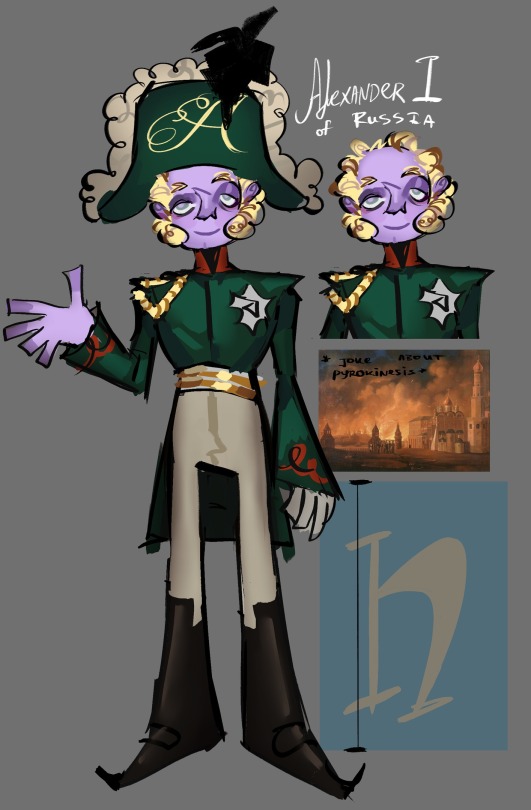
some other psychonaut art from the last year I never posted!! again :)
mosty bonapartes and one (1) crispin
i should draw something new but my mind is filled with fog at the moment. ah. !!!
cw: blood under the cut + heavily censored . gore(???)

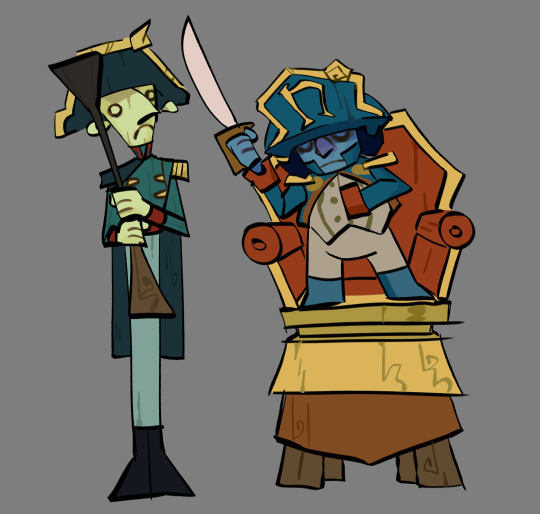
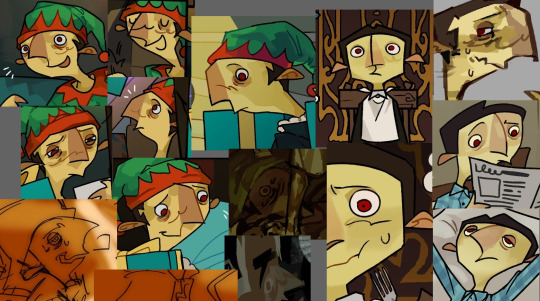
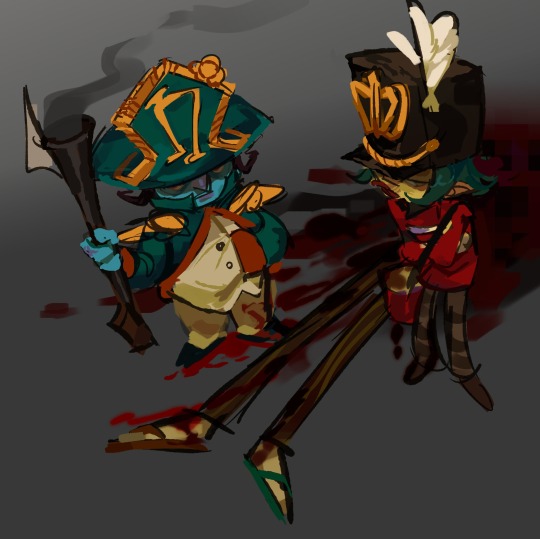
#*some sort of joke about alexander and m1lik being related because they both (presumably) slavic and purple*#how do i even tag this blond bitch#can you call sashen'ka <3 a psychonauts oc? crying#i like alexander as a historical figure. it's a shame i know so little about r0manovs tho.. I should read more about them...#i like history a lot............. i just never seen much of my homeland or studied in my first language to know these things. I fear.#i know some stuff about serb1a tho :)#cw blood#tw blood#<- just to be safe#psychonauts#fred bonaparte#crispin whytehead#napoleon psychonauts#art tag
77 notes
·
View notes
Text
Top Ten Historical Figures Done Dirty by The Terror (2018)
So, we all know and love Dave Kajganich and Soo Hugh’s beautiful show, right? Of course. But it’s important to set the historical record straight, especially when there are real people’s life-stories and legacies on the line.
(NOTE: this list is biased heavily toward upper-class individuals because the historical record does a better job preserving those voices for us. Was the real Cornelius Hickey as nasty a person in real life as he was in the show? Almost certainly not – which is why we’re given “E.C.” as a nod to the fact that we shouldn’t assume these characters represent real historical villains, even when the narrative makes them antagonists; HOWEVER, not everyone in the show was given the same courtesy as the OG “Cornelius Hickey.” Which is why this post exists – to show you the best sides of some people you might not otherwise appreciate for their full humanity. That being said, keep in mind the sources used – and, for instance, who has surviving portraits and who doesn’t.)
Thus, below the cut, I give you this list, (mostly) in order from #10 (honorable mention, only somewhat slandered) to #1 (most hideously maligned) – my list of characters from The Terror who deserved better.
(Please don’t take this too seriously – I know there are reasons why choices had to be made in order to make this show work on television, and I do very much love the end product. But I also genuinely think it’s a good idea to remember the real people behind these characters, and think critically about how we depict them ourselves.)
Bottom Tier – The Overlooked Men of the Franklin Expedition
#10. Richard Wall – & – John Diggle
We’re combining these two because they had a lot in common, historically speaking! Both were polar veterans, having served as a Cook (Wall) and an AB-then-Quartermaster (Diggle) on HMS Erebus under the command of Sir James Clark Ross in the Antarctic expedition of 1839-1843. Certainly we do get some good scenes with them in the show, but there was plenty more to explore there – for instance, Captain Ross was apparently so taken with Richard Wall that he hired him on as a private cook after the Antarctic expedition. (One imagines that Sir James may have regretted letting his friends of the Franklin expedition steal Wall out from under him.)
(If you want some more information on Diggle, the brilliant @handfuloftime found this excellent article on him – fun facts include the detail that Diggle’s only daughter bore the name Mary Ann Erebus Diggle.)
#9. John Smart Peddie
Now, I don’t think we should go as far as the Doctor Who Audio Drama adaptation of the Franklin Expedition, which makes Peddie into Francis Crozier’s oldest friend, someone “almost like a brother” to Crozier (no evidence of ANY prior relationship between the two existed, contrary to whatever the Doctor Who Audio Dramas would have you believe!) but Peddie probably earned his place as chief surgeon, however fond we may all be of the beautiful Alex “Macca” MacDonald, who was, in fact, the Assistant Surgeon, historically speaking. It’s hard to find information about Peddie, but someone should go looking! I want to know about this man!
(If you want to know more about the historical Alexander MacDonald, there’s a short biographical article on him from Arctic that you can read here.)
#8 James Walter Fairholme
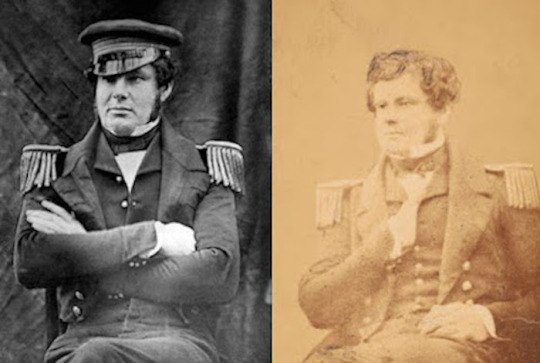
The only one of the expedition’s lieutenants who doesn’t really get any characterization in the show, which is a travesty! The historical Fairholme (pronounced “Fairem”) was, as they say, a himbo, and the letters that he wrote home to his father are positively precious. He loved the expedition pets (lots of kisses for Neptune!), and he needed two kayaks because he couldn’t fit into just one with his beefy thighs. Fitzjames loaned him a coat when all the Erebus officers had their portraits taken, and then called him a “smart, agreeable companion, and a well informed man,” and Goodsir singled Fairholme out as “very much interested” in the work of naturalist observations. Just a lovely young man who could have gotten some screen time, you know?
(Also, as @transblanky discovered, four separate members of the Fairholme family gave money to Thomas Blanky’s widow when she was struggling financially in the 1850s, making them, combined, the most generous contributor to her subscription.)
Middle Tier – Franklin’s Men Who Didn’t Deserve That
#7. William Gibson
Alright, I want to talk about how uniquely horrible the show’s William Gibson is: this is a character willing to lie and accuse his partner of sexual assault that didn’t happen. I get there were extenuating circumstances, but if I were a historical figure who died in some famous disaster and someone depicted me doing something like that? Let’s just say I’m deeply offended on the real Gibson’s behalf.
What do we know about the historical William Gibson? Not much – but we know a little. Gibson’s younger brother served on an overland exploratory venture across Australia in the 1870s… from which he never returned. (God, the Gibson family had the worst luck?) This description of a conversation that young Alf Gibson had with expedition leader Ernest Giles only days before his death is VERY eerie:
[Gibson] said, “Oh! I had a brother who died with Franklin at the North Pole, and my father had a deal of trouble to get his pay from government.” He seemed in a very jocular vein this morning, which was not often the case, for he was usually rather sulky, sometimes for days together, and he said, “How is it, that in all these exploring expeditions a lot of people go and die?”
I said, “I don't know, Gibson, how it is, but there are many dangers in exploring, besides accidents and attacks from the natives, that may at any time cause the death of some of the people engaged in it; but I believe want of judgment, or knowledge, or courage in individuals, often brought about their deaths. Death, however, is a thing that must occur to every one sooner or later.”
To this he replied, “Well, I shouldn't like to die in this part of the country, anyhow.” In this sentiment I quite agreed with him, and the subject dropped.
(From Giles’s Australia Twice Traversed which you can read here)
Beyond that, one thing we do know is that William Gibson was probably friends with Henry Peglar – they had served on ships together before, and Gibson may possibly have been the poor fellow found cradling the Peglar Papers, according to researcher Glenn Stein. So we might imagine the historical Gibson as a much kinder man than the show’s depiction of him – this was someone who befriended the clever, playful Peglar we all know and love from the transcriptions of his papers, so full of poetry and linguistic jokes. It’s a shame we didn’t get a chance to meet this real Gibson, who actually knew the Henry Peglar whom we love so well.
#6. Stephen Stanley
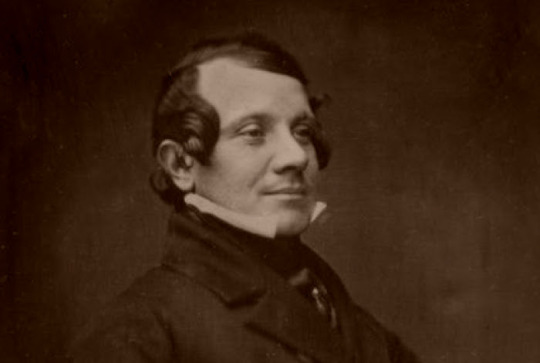
Look. There’s that one famous line in James Fitzjames’s letters to the Coninghams about how Stanley went about with his “shirt sleeves tucked up, giving one unpleasant ideas that he would not mind cutting one’s leg off immediately – ‘if not sooner.’” And certainly Harry Goodsir had some mixed opinions of the man, saying was “a would be great man who as I first supposed would not make any effort at work after a time,” and that he “knows nothing whatever about subject & is ignorant enough of all other subjects,” whatever…. that means….
But Fitzjames also had some rather nicer things to say about him, that he was “thoroughly good natured and obliging and very attentive to our mess.” Also, the amputation comment? Very likely had a quite positive underlying joke to it – Stanley may not have been much of a naturalist, but he was actually an accomplished anatomist, who won a prize for dissection in 1836, on account of his “bend of the elbow,” which was “a picture of dissection,” according to Henry Lonsdale, who also called Stanley his “facetious friend” and “a fine fellow” (Lonsdale 1870, pg. 159). So, the real Stanley probably was rather droll, but the perpetually cruel Stanley of the show misses some of the real man’s major historical virtues and replaces them with historically unlikely mass-mercy-murder.
#5. John Irving
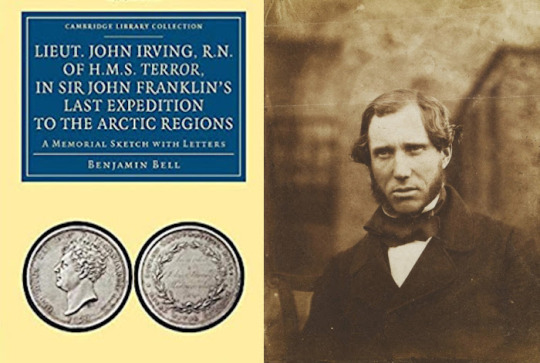
Now we’re getting into the territory of characters who did get some good development, but are missing a bit of historical nuance. As I’m sure many of you know, the historical Irving was indeed very religious, but the flashes of anger (i.e. against Manson) we see from Irving in the show don’t seem terribly consistent with the Irving depicted in this memorial volume, where John seems more like a quiet, bookish, mathematically inclined young man, with a self-deprecating sense of humor and a gentle sweetness. It’s really not at all far off from the version of Irving we see with Kooveyook in the show – I just wish we could have seen more of that side of Irving.
Top Tier – The Triumvirate of Polar Friends
So, these three DO have many good things to recommend them in the show, but because I’ve done such deep research on them, it can be quite jarring to watch certain scenes in which they behave contrary to their historical personalities, and I find myself pausing when watching the show with friends or family to explain that NO, they wouldn’t do that!
#4. Sir James Clark Ross
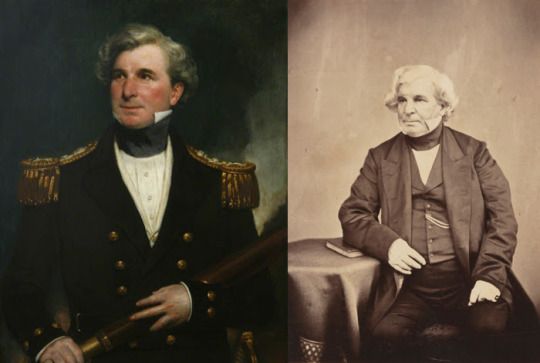
First thing – we LOVE Richard Sutton. He did a beautiful job with the material given to him. (This is true of all the actors on the list, frankly, but it’s doubly true here.) But that scene at the Admiralty where Sir James tells Lady Franklin “I have many friends on those ships, as you know,” to shut down her argument for search missions? At that time (aka 1847), historically, Sir James Clark Ross was actively campaigning for search missions, planning routes and volunteering his services in command of any vessel the Admiralty even vaguely contemplated sending out. You could see this real-life desperation in Sir James’s morose attention to his whiskey glass in that scene if you’re really trying, but I think the more historically responsible thing would have been to make vividly clear that James Ross risked life and limb, as soon as he possibly could, to try to rescue Franklin and Crozier and Blanky, men he’d known and cared about and bitterly missed – and, in the case of Crozier, “truly loved.”
#3. Sir John Franklin
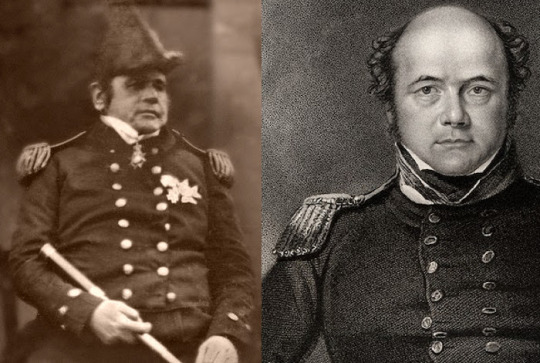
The historical Franklin had plenty of flaws – his contributions to British colonial rule certainly harmed no small number of people, and we should question the way that heroic statues of Franklin are some of the only memorials that serve to honor the lives lost on Franklin’s expeditions – especially considering the steep body count of not only Franklin’s final voyage, but his previous missions in Arctic regions as well. (DM me and I’ll scream at you about counter-monuments! Is this a promise or a threat? Who knows!) With that said, most contemporary accounts agree that Sir John Franklin treated his friends, his family, and those within his social orbit with kindness, and his cruelties were systemic, not personal. In this light, the image of Sir John viciously tearing into Francis Crozier’s vulnerabilities in the show feels very off. Though there was certainly some friction over Crozier’s two proposals to Sophia Cracroft, historically speaking, there’s no evidence at all that Sir John discouraged her from marrying Francis – Sophia may have had many reasons of her own (*clears throat meaningfully in a lesbian sort of way*) for not accepting any of the several marriage proposals offered to her (from Crozier as well as from others), and we ought to keep in mind that she remained unmarried all her life. The notion that the real Sir John would have considered Crozier too low-born or too Irish to be part of the Franklin family isn’t grounded in historical fact.
#2. Lady Jane Franklin
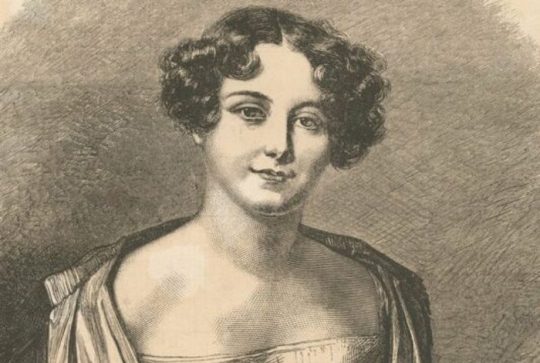
Again disclaimer: the real Lady Franklin left behind a legacy with much to critique. Those who rightfully point out the racism of her treatment of the young indigenous Tasmanian girl Mathinna should be fully heard out. Observations of her own contributions to imperialism are important and valid. Though I tend to see her feud with Dr. John Rae as somewhat understandable – given that Lady Franklin didn’t have the benefit of our hindsight knowing Rae was correct – the levels of prejudice that she enabled and even encouraged in the writing of Charles Dickens when he attempted to discredit Inuit accounts of Franklin’s fate are inarguably deplorable. These things being said, everything noted for Sir John re: Sophia Cracroft goes for Lady Franklin as well – there’s no reason to imagine a scene where Jane would bully Francis Crozier within an inch of his life, seconds after a failed second proposal, when, historically, Lady Franklin felt the situation was so delicate that it required the quiet and compassionate intervention of Sir James Clark Ross, a dearly loved mutual friend to all parties. Tension does not imply aggression; conflict is not abuse. We know this can’t have been an easy experience for the historical Francis Crozier, but the picture is a lot more complicated than what can be shown in one small subplot of a ten-episode television show. Because of this complexity, however, Lady Franklin’s social deftness suffers in the show. (I could also write an entire essay about Jane Franklin’s last shot in the show, at the beginning of Episode 9: The C the C the Open C – TL;DR is that framing is very important, and, at the very last moment, the show reframes Lady Franklin as a mutilated corpse, a speaking mouth without a brain, which is….. a choice.)
And, at number 1, the person done most dirty by The Terror (2018) is….
#1. Charles Frederick “Freddy” Des Voeux
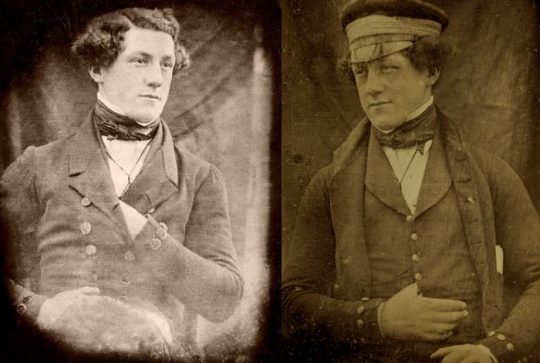
Look. I’m biased here because I am fed daily information about the historical Freddy Des Voeux from @frederickdesvoeux so I’ve become, I think understandably, a bit attached.
But this is very plainly the clearest cruelty the show does to a historical figure – the historical Des Voeux was a very young man (only around 20 when the ships set sail) known always as “Frederick or Freddy” to his family, and described by all parties as bright and sweet – Fitzjames said that he was “a most unexceptionable, clever, agreeable, light-hearted, obliging young fellow, and a great favourite of Hodgson’s, which is much in his favour besides,” and described him cheerfully helping to catch specimens for Goodsir. Des Voeux is named “dear” by Captain Osborn in Erasmus Henry Brodie’s 1866 poem on the Franklin Expedition (43) and Leo McClintock reported the young man’s well-known “intelligence, gallantry, and zeal” in his 1869 update to his account of the Franklin Expedition’s fate (xlii). None of this is consistent with Des Voeux’s behaviour in the show, especially in the later episodes.
To reduce Des Voeux to an easily-detested figure, over whose death one might cheer, is not a kindness – the creation of a narrative where his death is satisfying does damage to the memory of a real person, a barely-more-than-teenager who died in the cold of the Arctic and left behind only scraps of a shirt and a spidery signature in the bottom margin of a fragmentary document.
Television shows may need their villains, but it’s important to remember that real life isn’t like that. Surely the historical Frederick Des Voeux was most likely not a perfect person, and, as an upper class officer contributing to a British imperial project, he does bear some responsibility for the harm done by the Franklin expedition, but it’s not accurate to assume he was any less worthy of sympathy than the other officers who considered him a friend – those men whom we now venerate, like James Fitzjames. So as far as I’m concerned, Freddy Des Voeux deserves at least as much consideration, care, and compassion from us.
190 notes
·
View notes
Text
With today's Hamilton news, I've seen the onslaught of hate resurfacing- which is fine, self-expression is important- but I don't think everyone really understands what's going on here. Of course, I can't speak for all fans, but my love of the Broadway musical Hamilton does not cause me to "stan" or unconditionally praise the historical figures within the show. And really, none of those people are the reason I come back to the musical time after time.
IT'S ABOUT THE MUSIC. It's about the lyrics Lin wrote that inspire me when my life is falling apart. It's about the happy memories to which Hamilton was the soundtrack. It's about sharing my love of something beautiful with friends and family. Of course, not everyone is going to like the music and once again that's fine. I'm not trying to change anyone's opinion about whether or not they like Hamilton. I'm just trying to help you understand why the musical is beloved even if it's not loved by you.
Are there problems with the musical? Of course. It's man made and thus could never be perfect. Historical facts are missing or altered for the sake of the musical not lasting six hours. However, the purpose isn't to be solely informative. A musical is meant to be entertainment. If pure unbiased facts are what you're after, feel free to read all the history books you want.
While historical facts are missing or altered, the musical does not exclude certain events that show that the characters are complex and human. Yes, Alexander Hamilton is the protagonist. Yes, his achievements and struggles in life are highlighted. No, his affair is not swept under the rug. The affair Hamilton had with Maria Reynolds is a major arc within Act II and Hamilton does not go unpunished for it. The songs in which this affair is highlighted include "Say No To This", "We Know", "The Reynolds Pamphlet", and "Burn". ("Burn" is actually my favorite song as it is from Elizabeth Hamilton's perspective as she reacts to her husband's affair and the pamphlet Hamilton published about it to prove that he had not broken the law. It is gut-wrenching and the vocals are extraordinary.) There is so much more I could say but this is too long already.
I know I cannot stop the hate. People will always find some reason to hate on things that others love. Popular things are especially targeted because there is the misconception that all popular music, shows, movies, etc are empty in feeling or cheap or otherwise unworthy of being considered art. I don't know if there is some shame felt for "jumping on the band wagon" or some superiority complex in liking things that are "indie" or "unknown" or "underrated", but I've found that more and more people refuse to interact with some of the most beautiful things just because they are popular. And that's fine. You are entitled to your own choices and opinions, but please base those opinions in true fact instead of making assumptions on a topic you know very little about. I've hated things that I ended up loving a few years later and I regret being so closed-minded.
Once again, I am not trying to stop you from self-expression. This post is my self-expression and I wouldn't want anyone to shame me for putting my thoughts out there, so I would never do that to you. I hope you are safe and healthy regardless of whether you agree with me or not.
263 notes
·
View notes
Text
Scattered Thoughts on Treason: The Musical
[warning for some critical discussion]
The Cold Hard Ground:
First song I listened to.
God, we’re getting DARK. This is seriously a mix between a villain song and a hero song, and I’m HERE for it.
This is the one I’m possibly most interested in, because it’s really making me wonder how they’re going to portray the plotters: Are we going to be seeing them as fanatics, or as heroes, or somewhere in-between? In this song, it looks like Catesby is a man broken by grief who turned to fanatical religion as a way of coping with his own suicidal tendencies.
“So TAKEEEEE MEEEEEEEEEEE. You won’t BREEEEEAAAAAK meeee, it’s too late to SAAAAAAAAVVVVEEEE MEEEEEE.”
GOD those final notes are going HARD.
At first, I thought that it was rather scattered, musically wise, but the more I listen to it, the more I think it’s brilliant because the music comes together by the end, as Catesby seems to calcify in his convictions.
I’ll be really curious to see how anyone but Hadley serves this, but a solid 80% of this song, at the moment, is built on his impressive performance. I’ll be really curious in knowing how the livestreams went.
Take Things To Our Own Hands:
Honestly, my favorite song on the album, probably one of them that I can best visualize on stage.
WE NEED TO THINK OF A WAAAAAY TO BRING THE WHOLE SHIP DOWN.
Favorite vocal moment: When all the conspirators’ voices join one another, and then the moment at the end where it sounds almost like a church’s choir.
I absolutely LOVE the slick folkish feel to this, paired with the driven pace, it’s like if “The Story Told” from Monte Cristo decided to go folk, I love it. It really has a feel that I don’t see many musicals going for (Hadestown being the closest, though it goes in a jazzier style than this) , and that’s something really in its favor. If the rest of the songs follow this level of quality and tone, this musical is going to be a really, really fun ride.
Also, it’s very interesting in terms of how, even though this is the conspirators’ “Pump Me Up” song, there’s this very DARK overtone to it, which makes sense given what they’re proposing. Their voices go increasingly hard, almost into a staccato, and I wonder how much of that is diction VS them showing how hardened and increasingly radicalized the conspirators are becoming.
That being said: “I once had influenza but now that’s all gone when things turned sour”?????????????????? I’m trying desperately to wrap my head around this lyric, it sticks out like a sore thumb.
The lyrics in this particular song are, admittedly, its weakest point: They tend to be very, very repetitive, but, in all honesty, it doesn’t really bother me - It works with that mood of the conspirators becoming radicalized.
I know that Hadley tends to get most of the kudos for this song, but the other conspirators (Waylon Jacobs, Oliver Savile and Emmanuel Kojo) deserve MASSIVE kudos for their performances, I’m seriously going to be looking into all of them after this.
The Day Elizabeth Died
I started off not really caring for this song, but I’ve really warmed to it.
I’m really curious about who the main singer in this song is supposed to be, because I feel like that will really change how I feel about the lyrics specifying that she had “An inch of makeup on her face”. If we’re supposed to view this from the perspective of a devoutly religious 17th century Catholic woman, I can understand it more than a Protestant woman, given that it really, really works with some misogynistic stereotypes about Elizabeth.
So, the singer’s apparently Anne Vaux, which makes sense. Okay, I’ll give them this one. A little period-accurate internalized misogyny can be good for the soul.
I LOVE Rebecca La Chance’s voice. It’s so wonderfully clear and strong, delicate, but with steel beneath it.
There’s something almost....wistful, melancholy, and isolated about this song? It strikes a very odd balance between being sympathetic to Elizabeth (some say she died of a broken heart) while condemning her reign.
ALSO. BEST VOCAL MOMENT ON THE ENTIRE ALBUM. “We mourned for her, she was our queen, and for 45 years, she had reigned supreme.” And then the conspirators coming on with “WE DID NOT MOOOOOURRRRN FOR HER. SHEWASOURCAPTOR.” I could, legitimately, listen to that bit alone on repeat, I’m actually obsessed with it. That odd, conflicted feeling between Elizabeth having been Queen for longer than most of England had been alive, providing a sense of stability, while also the very real persecution that English Catholics were under. This is the kind of nuance I really want to see the musical carry forward.
Blind Faith
I don’t really know what to say except that Martha Percy’s love for Thomas Percy is juxtaposed with Thomas Percy’s feelings for Catesby.
Literally.
That’s the song.
If this musical ever develops a fandom, there are going to be a hundred Catesby/Thomas fics, with James/Thomas being the darkhorse fic.
It’s hard to judge this one, simply because it’s much more conventional love song - It sounds similar to, for example, “That Would Be Enough”, if Alexander Hamiltpn decided to blow up George III instead of join the American Revolution. It’s a TWIST on the conventional love song, but it still follows similar beats.
But I DO love how their voices go together, the song really starts to shine when that happens.
That last “This path was MINE to choose, he has nothing to prove”, probably is the best vocal moment.
Overall, I don’t have MANY thoughts on this song in comparison to the others, but I can also see myself warming up to it over time.
The Promise
“His face is quite nice” It’s VERY obvious they’re going for a queer comic relief interpretation of James, which I honestly have mixed feelings about given that he is, clearly, going to be the one that our protagonists are trying to get rid of. There’s.....something about that, a bunch of presumably straight protagonists ganging up to kill a stereotypically portrayed gay man. I know that historically, James WAS, but.....I still don’t like how stereotypical they played this one. Someone could point to Herod from JCS but, in all fairness, Herod was written in the 1970s (and, tbh, given that the central relationship in the musical is Jesus and Judas, you could argue that the entire musical is very, very homoerotic, which makes it less glaring.) This is...well, I’ll have to see how the musical deals with it. I’m willing to give it a fair shake, but they might have set themselves up for danger here.
But Daniel Boys is, admittedly, serving this song on a silver platter.
Really, really going into the Spoiled Child Route here.
If it sounds like I’m disappointed with this song compared to the others, it’s because......yeah, I kind of am. Musically, it’s fine and a little catchy, lyrically, it’s fine, but that nuance I’d been seeing in the other songs goes out the window. James isn’t my favorite historical figure of all time (Bro basically set up the English Civil War), but there still HAD to be a better way to do him justice than this.
It doesn’t hurt that, unlike the other songs, which were demonstrably TREASON, this one is very much.....a JCS/Hamilton rip-off. Like, it’s very, very blatant.
Love the rising strings when Percy tells him that Elizabeth is dying, that sense of tension - It does remind me a little of something I heard in The Pirate Queen, but you know what? I’ll give it to them.
Lowkey obsessed with Oliver Saville’s eyebrow raise when he says “You could save England.”
The problem is that they’re leaning so hard into the comic route that, when James says that he’ll be a fair king, it really, really makes the Catholic nobility sound dumb as Hell to listen to him. Like “Yes, man who routinely, gleefully sings about cutting off people’s heads, I’ll listen to you!” I know they’re desperate but....come on.
But also. THAT HIGH NOTE. Daniel Boys really put 110% in there.
Overall, my takeaway is that this musical could either do very, very well or very, very badly, depending on how they play it. It’s hard to judge because the public only has access to 5 tracks (except for the lucky ducks who bought tickets to the stream, where they got access to 10) - It’s hard to judge a musical based off of 5 tracks, and a musical about the Gunpowder Plot with, say, a love song called “Blind Faith” almost sounds like something out of a parody, something destined to be one of those flops that go down in history. BUT, that being said, the musical has some very strong vocal performances and some really good music, when it keeps to its own mood and style instead of trying to go off of what other, more successful musicals have done. There’s some real, real promise in this musical, and I’ll be both anxious and excited to see how it all turns out (and if they ever offer a full purchase for the live recording......I’d honestly probably buy it.) It was a shame I found out about it so late in the game, because I’d have totally bought tickets to the stream if I had known earlier.
14 notes
·
View notes
Link
From left: Photo by Gi Naps/Getty Images; Photo by Rose Hartman/Archive Photos/Getty Images; Photo by Victor Virgil/Gamma-Rafo via Getty Images
Today, the House of Jean Paul Gaultier is relaunching its ready-to-wear line after a hiatus of six years. It comes 16 months after fashion’s “Maestro of Mehmed”, as journalist Georgina Howell dubbed her in the early ’90s, took her final bow as the brand’s designer, implying that this iteration of its namesake. will not be designed. Instead, the reins are taken over by a dedicated team from their atelier, with help crafted from the rotating doors of some of the most independent designers working today – Palomo Spain, Ottolinger, Nix Lecourt Mansion, Alan Crosetti and Marvin M’Tumo .
Since starting his own label in 1976, Jean Paul has been instrumental in turning underwear into acceptable outerwear, making sailor fashion sexy and, more generally, paving the way for designers to experiment with diverse and unexpected castings on the runway. have been responsible for. He also dedicated an entire collection – AW97 – to the fight against racism. The collection, titled ‘Fight Racism’, featured graphic prints of young anti-fascists with slogans printed on their chests.
In fact, with such a rich history behind it, and vintage JPGs becoming increasingly collectible since the recent renaissance—partly stemming from the Kardashians’ love of all things net—more thanks to the label’s revival. Couldn’t be the right time- the line to wear from now. Although it is a well-known fact that Jean Paul himself decided to step back from the category in 2014 after a somewhat tumultuous feud with Florence Tetier (graphic designer and co-founder). November MagazineNow serving as the brand’s creative and brand director, Ghar is poised to enter the field again. in an interview with WWDJPG’s general manager, Antón Gégy, described the relaunch as an opportunity to “celebrate Jean Paul Gaultier, its values, its archives and its history”. And what better way to raise the glass to the core of fashion? Horrible Instead look at seven of the most show-stopping moments from its most iconic era, the ’90s. Long live Gaultier!
Photo by Gie Knaeps/Getty Images
Madonna’s Conical Corset from the Blonde Ambition Tour, 1990
Back in 1989, when Jean-Paul Gaultier was told by an assistant that Madonna had told the audience, she was convinced that he was playing a trick with her. They knew how obsessed he was with her, just could not do be true But she soon found herself on the phone to the original queen of pop, making a match in ’90s fashion heaven. Naturally, Madonna already knew what she wanted: to create something for her that surrounded Jean Paul’s signature masculine-feminine crossover. Inspired by his love of the late ‘queen of Paris punk’ Edwij Belmore, Jean Paul conceived a pinstripe suit – the top of ’80s manhood – and a corset with the now famous conical bra, which he designed six years ago on AW84 had started for. /85.

Photo by Victor Virgil/Gamma-Rafo via Getty Images
Eva Herzigova’s cut-out dress, 1992
Thought harnesses were a new thing on the runway? Wrong! After all, you’re not known as a fashionista Horrible Without a sprinkling of kinks here and there, as this look proves well. Presented on JPG’s AW92 runway, this dress, so slick in its fit that clothes can even put on Eva’s body, exemplifies the powerful-yet-playful take on sexuality that serves as a throughline throughout the French designer’s body of work. runs as. Styled with bicep-clad opera gloves and proudly crafting the Czech-Italian supermodel’s bust, there’s a distinctive dome-y tone at play here, though no compromise on the beauty of the silhouette or the quality of the make. It speaks to an ideological throughline that runs through Jean Paul’s work – that no matter who a woman is or wants to be, she always has the right to be chic!
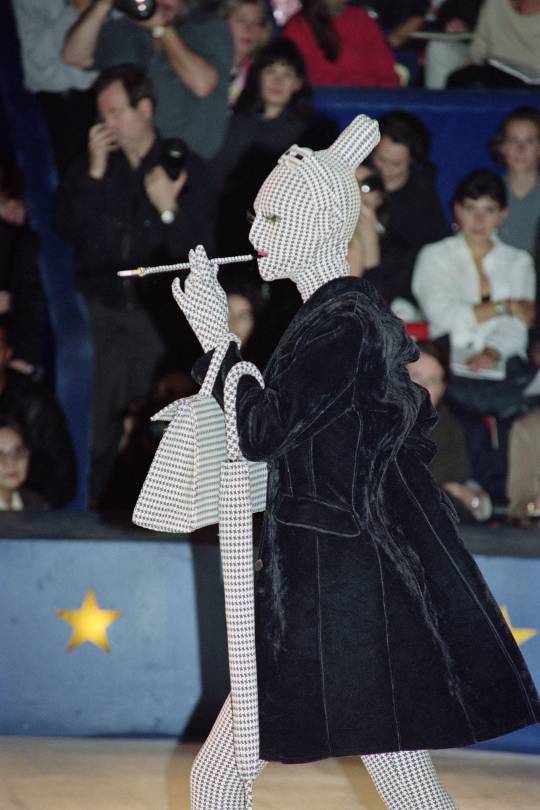
Photo by Pierre Guillaud/AFP via Getty Images
Houndstooth bodysuit inspired by Leigh Bowery, 1991
In an interview with iD in 2018, Jean Paul declared his love for the “London Way”, which means “just creating your own style, your own creativity and being free to do what you want to do”. When he took the idea back to Paris, it wasn’t very popular, but that didn’t stop him from creating his own trademark approach to design. He spent his youth in the 80s at famous London nightclubs such as Blitz and Heaven, where he met performance artist Leigh Bowery. In a nod to Bowery’s influence on fashion, Jean Paul sent down his interpretation of the Leigh Bowery Houndstooth bodysuit—which would later inspire Alexander McQueen for AW09 and Gareth Pugh for SS07.

Photo by Pierre Guillaud/AFP via Getty Images
‘Chic Rabbi’ Collection, 1993
For AW93/94, Jean Paul presented the ‘Chic Rabbi’ collection, inspired by the traditional dress of Hasidic Jews. Models in streamels and black suits danced to the sounds of a violinist who played live on the catwalk. The usual circle of supermodels was there, but Jean Paul also decided to cast someone who visually embodied the cultural context: a man with a big beard. During the ’80s and ’90s, designers were known for their casting choices, pioneering their diversity. “I’m fascinated by strong personalities, people who capture my imagination because they walk well down the street,” Gaultier explained in a 2014 interview. “Showing just one type of girl is a flaw,” he adds, “something I’ve always fought with. One kind of beauty – no. If I show a bigger girl, I’ll always show a younger girl.” will show.” It is now legend that Gaultier once posted an advertisement in a French daily newspaper release Looking for “atypical” models, saying that “facial distortions should not be avoided in application”.

Photo by Arnal/Garcia/Gama-Rafo via Getty Images
Mesh Tattoo Top, 1993
Back in 1993, the trend Declared this prestigious collection as “a startling vision of cross-cultural harmony”. While we’d be inclined to cringe at the somewhat reasonable look now that Jean Paul drove down the runway for the SS94 (which can actually be read as another nod to Leigh Bowery) it certainly Historical perspective. It also marked the debut of Jean Paul’s iconic mesh tops, which were inspired by a tattoo convention he once found himself spinning around – today, they are some of his most sought-after designs. The collection also includes heavy notes of punk, grunge, and 18th century men’s frock coats made in Jodhpur and denim in the typical JPG style. How did he ever find the place for all this?!
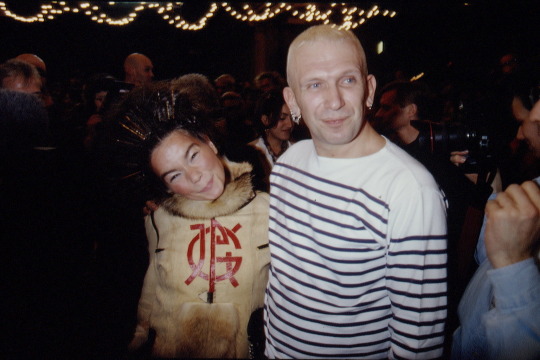
Photo by Pierre Vuthe/Sigma/Sigma via Getty Images
Björk!, 1994
Jean Paul’s celebrity friends don’t start and end with Madonna. A year after Björk’s properly titled debut solo album, First entry, Taking the music and fashion worlds by storm, she appeared on the designer’s AW94/95 show, about a magical train that stopped in a small village somewhere high in some mountains. And what, duh?! As you’d expect from JPG, the show was a mish-mash this time in terms of different styles of traditional arctic costume. The models trotted down the snow-covered runway (which almost tripped Kate Moss), decked out in a hell of a lot of fur, silk, wool, and leather.
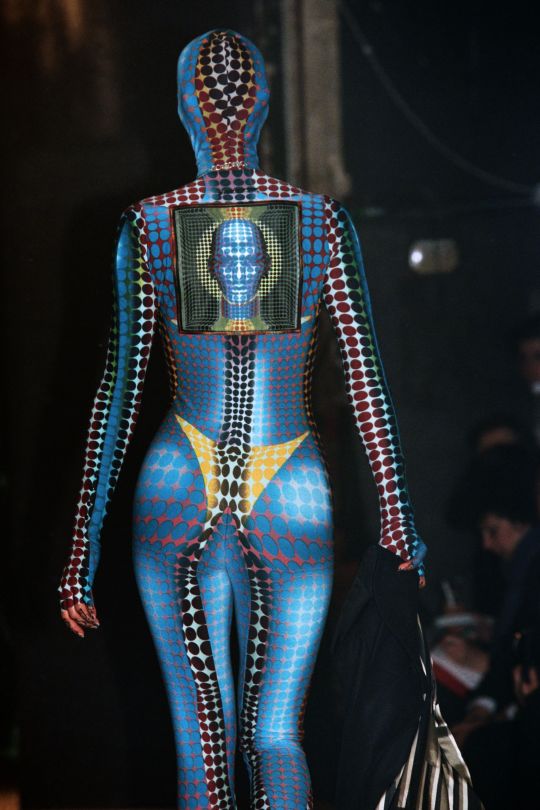
Photo by Pierre Verdi / AFP via Getty Images
Op-Art Inspired Catsuit, 1995
Two women riding a motorcycle hit them. One of them descends and climbs onto a loft at a DJ booth. Jean Paul’s AW95 ‘Mad Max’ Show Has Started. As he was in the middle of designing the costumes for Luc Besson’s famous film fifth element In which Bruce Willis and Milla Jovovich fight a mysterious cosmic force, they had science-fiction in mind, which means it was technology and cyber-heavy. The bodysuit inspired by Viktor Vasarelli’s op-art paintings became the show’s most memorable aspect—now made super collectible by Kim K and Cardi B and partly responsible for the JPG-madness we’re seeing on Depop these days. Also on the show was Carmen Dell’Orefice, who walked with a live falcon on her arm and sported ornate football armor that lit up like a circuit board. Really prestigious.
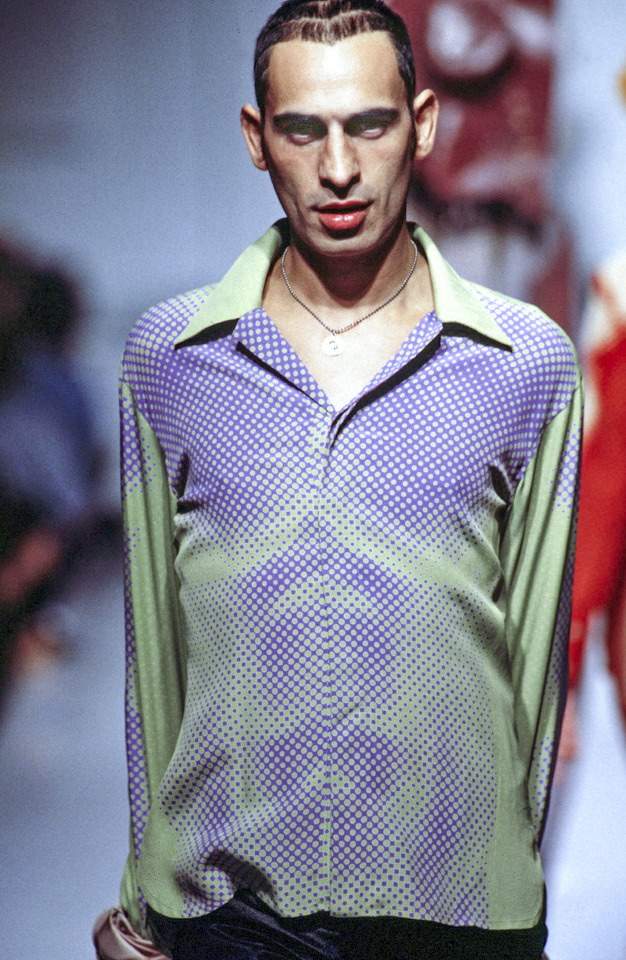
Photo by Victor Virgil/Gamma-Rafo via Getty Images
trompe l’oeil torso top, 1995
The next season, Jean Paul took his quest for sci-fi polka dots further, this time translating it into menswear. This time, however, he brought his knack for trompe l’oeil print placement to the table—skills he had previously flexed in the aforementioned Les Tautouzes, and even as early as 1992, when he sculpted the enviable Presented Printed Mesh Top with Toros. The look sported here by Tanel Bedrossiantz is perhaps a little more figurative in its approach, though no less direct is its infrared-style suggestion of what might lie beneath the longtime house muse’s button-down shirt.
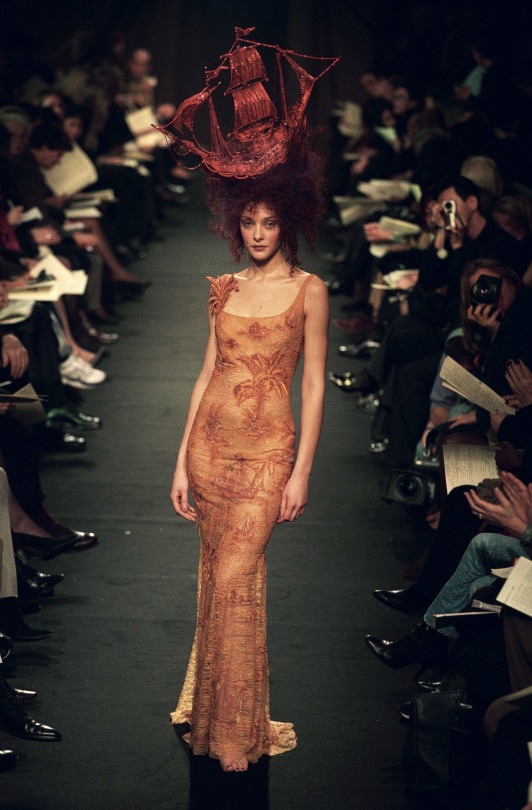
Photo by Danielle Simon/Gamma-Rafo via Getty Images
JPG Set Sale, 1998
In a promo video for JPG’s new ready-to-wear line, Bella Hadid is wearing a big red ship on her head. In case you didn’t already know, it debuted at the Haute Couture SS98 show, where it takes us back to the Age of Enlightenment. It was a time of scientific progress, the advent of modern capitalism and of course colonialism. The ‘explorers’ were sailing around the world from Europe, ‘discovering’ new lands for them – a ship serving as a nod to the continent’s shameful past. Some say, however, that it was during the Enlightenment that the fashion we know today – as a form of self-expression that can be accessed by the public – first began to emerge, making the historical period a fashion show. became an ideal subject. .
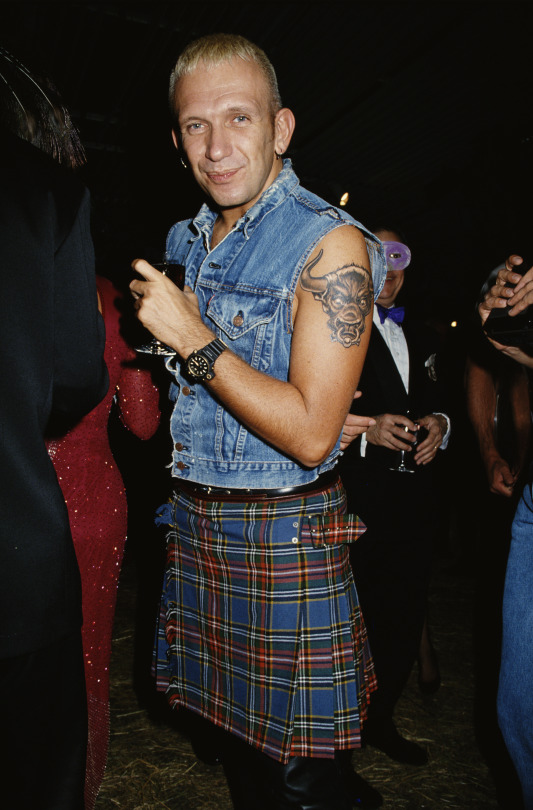
Photo by Rose Hartman / Archive Photos / Getty Images
Man Himself!, 1992
Sure enough, to write a list of Jean Paul Gaultier’s most iconic looks from his most iconic decade, and not for the man himself. Indeed, as Florence Tetier spoke to her before the label’s launch, “Everybody knows who she is!” whether it’s his striped Whether paired with a pleated black skirt or, as seen here, a denim vest and a punkish tartan kilt, JPG’s personal style has made her one of the most instantly recognizable designers of our time. Plus, there’s a direct connection between what she wore and what we then saw on the runway. While we may have never seen a proper, French Navy-standard Sailor From the designer, “he’s done a lot of stripes and nautical-inspired pieces,” notes Florence. “It’s really nice to see the link between the way he dresses and the way he designs.” we love you, Jean Paul!
Follow iD on Instagram and TikTok for more fashion.
.
The post Jean Paul Gaultier’s most iconic 90s moments appeared first on Spicy Celebrity News.
4 notes
·
View notes
Text
You’re Only As Old As You Feel
Alec has always been fascinated by Magnus' stories about the past, and all the historical figures he's encountered. Shame almost none of them are true.
Rating: General Audiences
Characters: Alec Lightwood, Simon Lewis, Magnus Bane
Pairing: Alec Lightwood/Magnus Bane
Read here on AO3
Alec wasn’t sure he’d ever been to Simon’s place before. It was a glorified shed, tucked in a corner of the docks opposite the Jade Wolf; Alec was sure he’d remember knocking on the huge iron door. If it were up to him he wouldn’t be here at all, but Magnus needed more vampire hair, and Simon needed a haircut, and had promised Magnus the cuttings in exchange for Magnus’ help buying some new clothes.
Magnus had a last minute meeting with a client,one who’d called in the middle of the night and spoke in quick, furtive tones, and so Magnus had been busy brewing in his apothecary all day. Alec figured he’d swing by to Simon’s and pick up the hair on his way back from the institute. He liked doing Magnus favours. He always looked surprised when Alec handed him a gift or did something unexpected; no matter how long they’d been together, there was a part of Magnus that couldn’t quite believe that Alec wanted to do things for him.
Simon was taking ages to answer the door. Was he in? Alec knocked again, and listened for movement on the other side. He could vaguely hear some shouting coming from the other side of the door, and in a few more seconds it was wrenched open, Simon looking harassed as he stuck his head out. “Alec?”
“Hey,” Alec nodded, digging his hands in his pockets. “Are you alright?”
“What? Oh, yeah. Yeah, I’m fine, I was just playing video games. What’s up?” Alec couldn’t blame Simon for looking worried; the two of them had literally nothing in common, and it wasn’t like they were particularly close. He probably thought Clary had been kidnapped by the monster of the week or something.
“I just came by to pick up that hair for Magnus? Is that alright? Just thought I’d do something nice for him.” Alec explained, and a grin broke out on Simon’s face.
“That’s the cutest thing I’ve ever heard. You guys are so freakin’ cute I can’t cope. Come on in, man.”
Alec smiled a little as Simon led him inside, having gotten used to Simon’s intense enthusiasm for everything Magnus-and-Alec by now. “You’ve got a nice set-up in here. I thought it’d be damp and gross.”
“It is, kinda,” Simon shrugged, looking around at the grey concrete walls, “but it’s home. It’s better now I’ve got a proper bed and a TV. Do you play video games?”
“Not really,” Alec answered, “went to the arcade a few times with my Aunt in San Fran when I was a kid, but I wasn’t ever that interested.”
“I guess when you can kill weird monsters in real life, most video games lose their charm, huh?”
Alec smirked. “Something like that. What are you playing?” On the screen was a figure dressed in rags, armed to the teeth with bows and blades. There were lots of statistics next to him, and Alec perched on the arm of the sofa to take a closer look.
“Oh, Assassin’s Creed. Hey, you’d probably like it. You use a bow and shit. Check it out,” Simon vaulted over the back of the sofa and grabbed the controller, coming out of the menu and going back into the game. “See, right now I have to kill everyone in this camp and grab some information.”
Simon had his guy hidden in the bushes, inching round the camp and picking them off one by one. Alec watched him for a few moments, his head tilted to the side.
“That’s not very efficient.” Alec hummed, “you should go up on that high building in the middle and just shoot them all with arrows. There’s less chance of you getting hit that way.”
“Well, of course you’d say that.” Simon chuckled, pausing the game again and going to the controls tutorial. “Here, try it. You got time, right?”
Alec checked his watch. Magnus wasn’t going to be done until six, and it was only 4.30. He took the controller from Simon. “Yeah, I’ve got time.” He shrugged, turning his attention to the weird knobs on the controller.
~~~~~~~~~~~~~~~~~~~~~~~~~
“Alright, I can sort of see why mundanes like video games. Although these bows and arrows are bullshit; you don’t have to account for wind or anything. A child could do this.”
“Says the guy who got killed in the first thirty seconds after running out of arrows.” Simon teased, watching Alec’s eyes flick across the screen with amusement. He’d never seen Alec so engaged in anything frivolous. It was nice to see him like this, enjoying something and not thinking about something life threatening or world-ending.
“Listen, the controls are hard to get used to, I am a novice, give me a break,” Alec tutted, “oh shit, is that supposed to be THE Cleopatra?”
Simon nodded, “yeah, yeah, you work with historical figures in each Assassin’s Creed game. This one is pretty cool, it’s the most ancient one, it’s set in like… 300BC or something, I don’t know. A long ass time ago.”
“Wait…” Alec paused the game, and narrowed his eyes at Simon. “I thought Cleopatra was around like 400 years ago.”
Simon tilted his head to the side. ”They don’t teach mundane history at the Clave schools, huh?”
“But…” Alec frowned, “Magnus said that he slept with Cleopatra. He references it at like, every opportunity. And his file says he’s no more than 450 years old.”
“Oh my God…” Simon pressed his lips together to keep from laughing. “You… You know Magnus is full of shit, right? Like… Half of his stories are utter bullshit? Did you not know that?”
Alec’s eyes widened. “So he didn’t sleep with Michelangelo either?!”
Simon threw back his head and laughed. “Oh, Alec, my sweet Prince of the shadow world… No. No, he did not.”
~~~~~~~~~~~~~~~~~~~~~~~~~
“Hey, hot stuff!” Alec called as he let himself into the apartment a little while later, “where are you?”
“In the kitchen!” Magnus replied, and Alec followed the sound of his voice, trying to keep the smirk off his face. “Hey!”
“Hey,” Alec hummed, kissing his boyfriend softly on his mouth. “I have something for you.”
Magnus’ face lit up like it always did when Alec surprised him, and Alec couldn’t resist kissing his cheek as he pulled the jar of Simon’s hair from behind his back. Magnus took it from him and gave him a gentle hug. “That was very sweet of you, Alexander. Thank you.”
“It’s no big deal, I just swung by Simon’s place on the way home from work, thought I’d save you the portal. I actually had a good time hanging out with him.” Alec admitted, picking up the wooden spoon next to the stove to stir whatever delicious concoction Magnus had been making. He gave it a taste and hummed. “You’ve had this cooking all day, haven’t you?”
“Made it right after you went to work,” Magnus shrugged, wrapping his arms around Alec from behind. “What did you and Simon talk about?”
Alec smirked, keeping his tone casual. “Well, he was playing this video game about Ancient Egypt, it was very educational.”
“Yeah?” Magnus asked, distracted by the soft kisses he was pressing to the nape of Alec’s neck.
“Mmmhm… It even had Cleopatra in it. Your old friend Cleo.”
Magnus hummed, pressing his nose into Alec’s hairline. “Wonder if they got her face right.”
Alec laughed, turning around in Magnus’ arms. “You’re so full of shit. He told me that Cleopatra was around like 2,000 years ago, and I know you can’t time travel.” He poked Magnus in the side. “I can’t believe I believed that you actually made out with Cleopatra.”
Magnus at least had the grace to look sheepish. “It’s cute when you believe those stories. I couldn’t resist.”
“It’s cute that you think 400 years of life isn’t impressive enough.” Alec snorted, his hands stroking Magnus’ sides. “I couldn’t believe it when Simon told me. I was like ‘NO!’ Simon was laughing so hard he almost started crying blood.”
Magnus laughed, stroking Alec’s cheek. “I’m sorry I made you look foolish in front of your new best friend.”
“Nah, it was kinda funny. I should’ve clocked that not all those stories could have been true. I mean, your line about the Dead Sea…”
“If I’m being honest, I use that line every chance I get.” Magnus admitted.
Alec pulled away, and grabbed a wine glass from the cupboard, holding it up with a floppy wrist. “I was alive,” he said in an melodramatically foppish voice, “when the Dead Sea was just a lake that was feeling a little poorly.”
“Oh my God, shut up,” Magnus whined, plucking the wine glass from Alec’s hand. “Alright, alright, now you have teasing material, at least have some grace about it.”
“Nope,” Alec insisted, popping the ‘p’. “I’m never letting this go.”
Magnus groaned, burying his face in Alec’s chest. “I should’ve known better to try and pull a fast one on you.”
“Oh, also, I know what I want for Christmas.” Alec announced, running his fingers across the short hair on the back of Magnus’ head.
“Yeah?”
“I want an Xbox One. I had fun playing with Simon, and he said if I had my own we could each play in our own houses but together, which would be cool because then I could turn off his small talk if I wanted.” Alec explained, eyes alight with childish excitement, and Magnus smiled, going on his tiptoes to kiss his nose.
“I can do that.”
Alec sighed happily, kissing Magnus’ cheek. “So… Which stories were actually true?”
Magnus grinned. “Well I did actually kidnap Marie Antoinette in a hot air balloon…”
51 notes
·
View notes
Text
The Parable of the Two Brothers - Its Application In Modern Society
This blog is written in the United States. As such, the content of this blog will comment particularly on issues within the U.S. However, if you are a reader outside the U.S., feel free to continue. You will see the complex dynamics of U.S. society in a new and interesting way.
In this post, I use the terms “African American” and “Latino”. I’m aware that the entire picture of ethnicity is much more nuanced. African Americans are indeed distinct from Afro-descended peoples of Latin America and the Caribbean, and from those of the African continent. A Cuban has more in common with a Jamaican or a Trinidadian than with an Argentine or a Paraguayan. I use these terms only for the simplicity of writing, and I’m sure you will understand who I’m referencing through this language.
For this post, I will start with a powerful parable from the Man2Man Alliance. This parable was written by Alliance contributor Robert Loring, and was published on Armistice Day 2006. It was originally published as part of a larger discussion page, entitled “While society slouches towards matriarchy, single-sex schools make a comeback -- is the agogé far behind?”. The following excerpt will be shown below uncensored, and in its original formatting.
In context, Mr. Loring is reacting to articles and content posted the day before, by Alliance founder Bill Weintraub.
~~~~~~
[Start of excerpt]
Thanks for posting these two articles Bill. They just confirm what I have, in fact, been saying for YEARS now. Our society is NOT normal nor is it NATURAL. And no matter how some wish to delude themselves into thinking otherwise we all feel something deep down within us that reminds us that our present society is NOT the historical/traditional NORM and that there is definitely something WRONG with society today.
Suppose you had a brother whom you considered fairly normal while the two of you were growing up. Then one day you brother began to change for no apparent reason. He suddenly stopped wrestling with you and he stopped hugging you. He obviously begins to withdraw into himself and you know it because you can see all the signs in his change of behavior that tell you something is wrong with your brother.
Time goes by and your brother stops displaying his masculine nude body to the world. Suddenly, you can see shame set in as he no longer goes without a shirt and never exposes his genitals like he did in the past. Once, you know, he was proud of his developing manhood but now it seems that he has become insecure and ashamed of his manhood. You begin to get concerned for your brother and you try talking to him to find out what is wrong. But, little brother won't talk to you on any level below the superficial. He avoids answering your questions and he assures you that there is nothing wrong, nothing bothering him.
Once the two of you wrestled endlessly night and day but now you notice that your brother rejects your invitations to wrestle. You can tell that there is now an emotional distance between the two of you and that it's getting wider. Little brother becomes very homophobic and you soon discover that ANY male-male contact or expression of emotion is quickly deemed "faggot" by your little brother. Little brother now spends endless hours talking about "faggots" and pointing out everything around him as being "gay." When he sees two males hugging he really goes ballistic because he deems such behavior as "really gay!"
Time moves on and little brother gets a job and marries. He becomes consumed in his job and when you see him that's all he seems to want to talk about. You soon figure out that the reason for this is because he is avoiding talking about his feelings. He wishes to avoid talking about his feelings because he is in a state of denial and he thinks he's doing a great job at hiding from you what is bothering him. But, in fact, HE'S NOT!
Little brother's marriage does not go well and doesn't last long. Little brother has slid into a daily life of alcoholism and his wife believes he has also slid into a life of sexual addiction because she knows he's having affairs with other women and, she suspects, maybe even with other men! Little brother's marriage ends in a nasty divorce and the children he and his wife bore pay the price (as always) for they now are forced to live the broken home life.
Time goes on and little brother isolates himself more and more not only emotionally but now physically as well. You're worried about him because you know something is badly wrong with him and has been for awhile. But, he won't talk to you and he denies everything you say to him about his growing problem. Now, lost in his own self rejection and dislike he drinks more and more. You begin to realize that you don't even really know your little brother anymore. He has become like a stranger.
Little brother maintains that there is nothing wrong with him. He tells you over and over that he is "fine and normal." But, you know that this is not so. You know that he is not "fine and normal." One afternoon a police officer comes knocking at your door to inform you that they have found your little brother dead. He put a bullet in his head. All these years you were torn. You knew there was something wrong but at the same time you wanted to believe what little brother said, that he was "fine and normal." But now, on this sunny afternoon with the police officer standing in front of you everything you suspected about little brother NOT being "fine and normal" is blatantly CONFIRMED.
Would you think that a little brother being like this was "fine and normal?" Would you conclude that he was just doing what other males do normally and naturally? Would you reject your own suspicions that there might be something very wrong with little brother? Would you stand by doing nothing as you watch little brother sink further and further down the abyss of abnormalcy, isolation, alcoholism, and major depression? Could you not see that little brother was on the road to SELF DESTRUCTION? And would you really be so surprised when the police came to tell you little brother had committed suicide?
Little brother is our modern industrialized society folks. No one in their right mind would see all these major changes in little brother and fail to realize that something was really wrong with little brother. So, do we continue to ignore little brother and downplay his symptoms hoping that everything will be ok? Will we continue to close our eyes to the FACT that NOTHING IS OK with little brother right now? Will we be so surprised with modern society commits societal suicide?
The past few decades have seen a dangerous ideology promoted. That being that the world is all about "Me! Me! ME!....Wonderful ME!" But the FACT is that the world is NOT all about YOU! It's about US!! All 6+ billion of US! The only thing the ME focus has done is to force people into isolation and neurosis more and more. It has taken what is historically and traditionally RIGHT and turned it into wrong while at the same time it has taken what is wrong and turned it into "right." Somehow....someway....people have got to band together and fight against the raging tide of the unnatural that is beating us all today. If we don't then I can assure you that we will witness and be an involuntary part of the coming societal suicide. Something IS WRONG with little brother! It's NOT going to be OK! It is NOT going to all go away either! BIG brother is going to have to take some action and help little brother right himself up again. Little brother is modern society. YOU are BIG BROTHER!!
I love Jedi's idea of a society based on Sparta's model. [Note from this writer: “Jedi” is another member of the Alliance.] A WARRIOR SOCIETY! As I have said before, "The path of the Warrior IS the path to humanity's SALVATION!!" Society cannot go along the path it is now on for much longer. Something is going to give. We all know it and we all feel it. It's just a matter of time before it all comes unglued!
Homophobia, isolation, FEAR, depression, anxiety, selfishness, and egotism! These are what our industrialized, consumer-ridden society has produced. Industrialization might have made humanity's life easier BUT we are ALL paying the price psychologically, emotionally, and spiritually. Some of us are now asking, "Is it all really worth the price?" I'm one who shouts out a resounding, "FUCK NO!!"
And, as for masculine men such as Alexander the Great somehow being time warped into our own modern times he'd be a lost, confused man. He'd be a man who never would realize his potential for greatness and he'd die as a man unknown to the world. How can I be so sure of this? Because there are MANY Alexander's today in the world BUT they are SILENT and they refuse to come forth and claim the greatness that is RIGHTFULLY theirs! Instead, they stay in the shadows of society, hanging back, and they die unknown men. They feel like they do not belong in this time. They feel like men out of place and out of time. They innately know and honor the "old ways" of manhood and masculinity. The ways of the ancient Greeks and Spartans. The ways of true manhood and masculinity. Yet, they know that our upside down society would crucify them especially for their innate M2M love.
MEN NEED OTHER MEN psychologically, emotionally, spiritually, and PHYSICALLY!
Little brother is screaming out! Who will hear him?
[End of excerpt]
~~~~~~~
When I first read this parable a few months ago, I was struck by the description of the little brother’s decline. His growing dysfunction was often manifest subtly, in signs that could be explained away as other things. For example, his increasing discomfort with nudity could be explained away as modesty caused by puberty. His emotional and physical withdrawal could also be explained away as “normal” teenage angst and turmoil. His extramarital actions (especially with men) might be blamed on hypersexuality. Yet, Mr. Loring perceptively points out the real cause of all these developments: the little brother is letting society’s messages rent ever more space in his head, and increasingly hates the homoeroticism inside him. Thus, he proceeds on a path of slow and steady self destruction.
By saying that the little brother symbolizes modern society, Mr. Loring drives his point home - by increasingly embracing homophobia, society imposes all sorts of ills on itself. Those problems can be numerous, and will show up in many areas of life. At first glance, the relationship between some ills and homophobia might not be so obvious. However, with close inspection, it becomes clear that homoeroticism is not the concern of a minority. Instead, a society’s treatment of homoeroticism has ripple effects that are omnipresent and completely inescapable.
To that end, let’s explore three issues that are subtly but forcefully exacerbated by homophobia. These are problems that are wreaking havoc throughout the United States - drugs, gangs, and the modern dating crisis.
Regarding Drugs
Within the United States, illegal drugs have never been a bigger problem. At present, drug deaths are rising in all 50 states. Drug overdoses are now the leading cause of accidental death nationwide; deaths from shootings and car accidents haven’t come close in years.
Opioids in particular are feeding the problem, as they move through cities and towns with increasing volume. Heroin has become cheaper in past years, and as a result, is being more used across the board. Furthermore, while the drug death toll is greatest in cities like New York, Chicago, and Baltimore, the devastation has been most concentrated in Appalachia, New England, and the American Midwest.
As such, this might point to an unfortunate reason for the increasing press on drugs. For many years, drugs have disproportionately affected minority populations in the U.S. However, of late, the problem has greatly accelerated in the country’s Anglo majority. Appalachia, New England, the American Midwest and other like areas have a large majority of white Americans. Therefore, the problem is currently impossible to ignore as a minority problem. It’s now perceived as an issue that threatens the entire U.S. population.
However, the U.S. drug problem has ripple effects on other lands. The majority of illegal drugs in the United States come from Central America, South America and the Caribbean. In these regions, drug dealing has become a lucrative business, and the United States is one of the biggest customers. Because of this, drug violence is reaching crisis levels throughout Latin America and the Caribbean. Monstrous crimes within these regions are becoming increasingly frequent, with the most famous example being Mexico. As a result, and in a stunning twist of irony, people from those regions are fleeing to the United States, whose drug hunger is helping to destroy their homes.
So what connection does this crisis have with societal homophobia?
If we study why people take drugs in the first place, we may find the answer. Some people may do it just to rebel against society, especially if they’re teenagers and young adults. Others may do it just to please their peers, and to fit in. Others still might use drugs purely to experiment, and to experience its effects firsthand.
However, there is one reason that concerns us here. Quite often, people use drugs to get away from their problems, and distance themselves from their emotions. For a few minutes, they can feel better about themselves, and not be bothered by problematic situations and feelings. They can make their reality whatever they want it, even if it will come crashing down in a short time.
Is same-sex attraction one thing that most people are trying to escape through drugs?
If that seems odd, let’s take a few minutes to consider our world, especially within the United States. The majority of the population identifies as “straight”, while a minority (5% to 10%) identify as “gay”, “queer” or something similar. Within our sexual labeling system, “straight” is another way of saying “normal”. Exclusive opposite-sex activity is consequently considered a sign of “normality”. However, a fair number of those “straight” people are tacitly aware of their capacity for “abnormal” same-sex attraction. This is why websites like Yahoo Answers and Virtual Teen are littered with questions about experimentation from “straights”.
Now, consider the constant messaging “straight” people get on same-sex activity. This messaging is endless and unrelenting, and is transmitted explicitly and implicitly, formally and informally. To be specific, they are constantly told that if they entertain their same-sex attraction, they will uncontrollably and irreversibly become “gay”. By extension, this would mean that
they can no longer call themselves legitimate men and women, but instead are psuedomen and psuedowomen beyond all hope of being “normal”
they are uncontrollably predisposed to participate in anal play, which is objectively degrading and dirty
they are no longer on an equal basis with most of their peers
they are forced to make their own lonely path through life, with only feeble support from their “straight” friends
they are hopelessly predisposed to be high risk for many STDs
they cannot legitimately experience love with the opposite gender too, and have biological children
if they are Christian, they are now objects of God’s blazing wrath, and are fit for destruction
Because of this, they are compelled to rid themselves of this supposedly existential enemy. Yet, despite their best efforts, same-sex attraction may still persist in them, with no solution in sight.
I ask you, wouldn’t all that make you want to take drugs? However, this possible reason can never be suggested openly. If it was, it would implicitly mean that most people aren’t completely “straight”, and that modern sexual philosophy is a farce.
As such, the “gay” community at large is no help at all. In fact, they actually prove the point being made here. It’s well known that the LGBT-identified community has much higher rates of drug use than the general population. Some of this is for functional purposes: for example, poppers and other like drugs are used to enhance sexual pleasure. However, this is a relatively minimal reason why “gay” drug use is so high.
Instead, the reasons often stem from their identity and sexuality. Homophobia is often cited to be a major cause, as mental and physical health issues caused by it push them towards drugs. Indeed, as DrugRehab.com puts it, “internalized homophobia may result in self-loathing among LGBTQ+ people and may be a trigger for substance use.” The “gay” scene is also blamed, since alcohol and drugs are often used in “gay” clubs and other meeting places.
For “straight” people, reading this might seem confusing. After all, they might ask, isn’t this something “gay” pride is supposed to solve? To gain enough self-esteem to face the world? To improve one’s sense of self-worth? How can those people drown themselves in drugs because of their sexuality, yet claim to have pride in their sexuality? How can people with pride apparently hate themselves so much?
They will only find the answer when they analyze the central message of modern sexual philosophy, and of the “Straight”-”Gay” dichotomy that philosophy constructs. The message is quite simple, and yet quite powerful - that same-sex activity is inherently abnormal and aberrant, and should be viewed as such. Both the “straight” and “gay” sides agree on this message; their differences stem from how they react to it. The “straight” side accepts it and avoids anything related to same-sex activity. The “gay” side accepts it, internalizes it, and uses it to guide how they conceptualize same-sex activity.
In other words, by internalizing the message that all same-sex activity is aberrant, the LGBT-identified community tells itself that it is an aberration, and should be rightly treated that way. That kind of internal dialogue has powerful psychological effects. It’s no surprise then that, at the same time that they blurt out “pride”, the LGBT-identified community engages in conduct of self-loathing. Through its embrace of that message, the community has made internalized homophobia one of its pillars.
Of course, there are many other reasons drugs are so widely used. Larger social and economic dysfunction plays an unignorable role. A multifaceted solution which is focused on fixing problems, and not merely treating symptoms, will be necessary to tackle drugs. However, in formulating this solution, we cannot ignore the role homophobia plays in the problem. Nor can we ignore the role of homoeroticism in the answer.
Regarding Gangs
At present, the United States has a worsening gang problem. In 2015, gang violence was on the increase, even as overall violence declined. This problem has been seen in large U.S. cities, particularly in Chicago, where 2016 was its worst year for homicides in decades. According to the National Gang Center, the number of gangs existing has steadily risen from 2003 to 2012 (the last year they have data for). In an era of rising inequality and social unrest, the effects of gangs might increase even more.
People join gangs for all kinds of reasons, and it’s these that interest us here. Some may join for financial gain, as gang membership might guarantee riches or possessions. Others might join out of peer pressure, since their friends and family are already involved with gangs. A few might join purely to enhance one’s status, to achieve a fame that might otherwise be unattainable.
However, no matter where you turn, one huge reason always presents itself. The Los Angeles Police Department states it quite plainly: “To the majority of gang members, the gang functions as an extension of the family and may provide companionship lacking in the gang member’s home environment.” Gangfree.org lists “a sense of family” as the top reason why youths join gangs. It says further, “Young people might feel that they don't receive enough support or attention at home...gangs often make promises to give unconditional support, and to become the ‘family’ they never had.” This connects with other reasons that are closely related, such as seeking protection and being part of a group identity.
In other words, youth join gangs for reasons that appear counterintuitive. From what can be gathered, those youths join gangs simply to find love and appreciation. They want to be nurtured and cherished. They want to feel like they’re a part of a “family”, even if such a family is ultimately dangerous. If they can’t get love from their actual family, they will turn to a gang.
As such, it’s noteworthy that prevention methods often focus on fostering community spirit and identity. Sports teams, school bands, drama clubs, and the like are often singled out as solutions for gangs. These are environments that require collaboration, which help its participants to become familiar with each other. It makes the youth become bonded with their adult supervisor, but more importantly, it also helps youths create deep bonds with each other. It’s these bonds that are hoped to prevent, and often do prevent, those youths from joining gangs.
Given that, I feel compelled to ask the following question: should we look at homoeroticism as one way to help solve the gang problem?
Indeed, homoeroticism has an uncanny way of fostering an intense spirit of community, in a way that heteroeroticism simply can’t. Ancient Greece shows a premier example of that. Same-sex love was the bond that held its society together, and was openly and unashamedly manifested in all areas of life.
Its practice of pederasty allowed older youth to sexually bond with the younger, and thus let them enjoy a mutually beneficial relationship. The Sacred Band of Thebes, which consisted of men erotically bonded to each other, were repeatedly successful on the battlefields. The Ancient Greek gymnasium and Olympics were designed to foster same-sex love. This homoeroticism had many positive effects on Ancient Greek society, so that the aristocrat Phaedrus felt compelled to say the following: “...if there were only some way of contriving that a state or an army should be made up of [same-sex] lovers and their loves, they would be the very best governors of their own city, abstaining from all dishonor and emulating one another in honor...”
It should be noted here that Greek homoeroticism was entirely different from the “gay” sex model of today, which entirely pivots on anal play. Anal sex was taboo between men in Ancient Greece, and generally seen as a shameful act. Intercrural sex and what is today called frot was the main contact; mutual masturbation probably was part of the contact as well.
By contrasting the Ancient Greek approach to community with that of the modern United States, we can better see the differences between both, and what causes them. In Ancient Greece, the larger society acted only as a regulator of community spirit. The Greeks knew that same-sex love was a naturally occurring phenomenon, which would propagate itself without any human help. Societal institutions (pederasty, the Olympics, the Gymnasium) merely harnessed the power of homoeroticism for its own improvement, to further bind Greece together and move it forward. From what we can see, they succeeded spectacularly.
In this way, Ancient Greece spent relatively little energy creating and sustaining community spirit. They realized that homoeroticism was as natural as heteroeroticism. They recognized that without human assistance, boys would naturally have sex with boys, and girls with girls, often many years before they would be interested in relationships with the opposite sex. Usually, those sexual relationships had a tone of mutual respect and dignity, which kept them from engaging in risky and degrading behavior. Greece merely had to set up institutions, lay down simple rules to keep conduct respectable (like no anal sex between males), and that community spirit would consequently generate itself.
In fact, it actually takes much more energy to control or prevent homoeroticism. This is why modern sexual philosophy is a high-maintenance system that needs constant and comprehensive enforcement. It must be so, or else that philosophy would collapse under its own weight.
Contrast that with the scenario in the modern United States. At present, U.S. society is also a “free market” society, which works against any community spirit that would otherwise flourish. It creates a fiercely competitive world without much empathy or compassion, in which the weakest in society (including youth) suffer the most. In trying to counter the effects of gangs, community-minded institutions must constantly try to override this dominant culture. So far, though they have had some measure of success, they have not yet changed the trajectory of society.
Thus, unlike Greece’s simple role of regulation, modern community-minded institutions must instead act as feverishly aggressive propagators of community spirit. Nobody else will do it, and the present environment is extremely hostile to any sense of community that doesn’t serve neoliberalism. These institutions are an insurgent force against a culture that is deeply entrenched and established, and they must expend intense energy just to make a dent. In fact, they must work like ants even to survive, because they have only meager support from larger society. Meanwhile, the dominant attitude of same-sex love - that it is a weird abnormality - blocks these institutions from reaching their full potential.
Case in point: the NBC newsmagazine “Sunday Night With Megyn Kelly” recently covered a high school basketball team in Chicago. Under the leadership of team coach Lou Adams, the basketball team isn’t merely a basketball team. Instead, the team has become a family, where Mr. Adams has become a father, mentor and protector to the boys under his charge. For over twenty years, he has expended himself wholly to the people he serves. In return, his team greatly appreciates his efforts, and reward him with their love and affection. In fact, during a pep rally for the basketball team, Mr. Adams got choked up with emotion, and the team responded by embracing him on stage. What was the message they gave to Mr. Adams? “We love you coach.”
As I watched the report during its original airing, it was hard not to well up with tears.
However, there was a few questions I still had. Firstly, did the team members love each other as much as they did Mr. Adams? That’s equally important, because that bond will keep them out of trouble long after they leave the team.
Furthermore, are they willing to show that love in action? To me, that’s where the rubber hits the road. Mind you, given that they’re all in a sports team, they likely do have affection for each other. However, if they openly show it outside of a sports setting, “gay” rumors might quickly take flight. Some of those players might internalize those attitudes, and restrain from showing their teammates any affection, because they don’t want to act “gay”. As a result, the efforts of Mr. Adams can never have their full effect.
In tackling this problem, the LGBT leadership and media are no help at all. In fact, they are actually a hinderance. They are the ones responsible for defining the word “gay”, which is at the center of the problem described above. They are the ones who insist on infusing the word with contradictory meanings, purely for their own advantage. One is a sexual meaning, while the other is a sexual, cultural, and political meaning. Through this combination of definitions, “gay” leadership can claim that same-sex activity and “gay” culture are independent in one moment, and alternatively claim they are linked in another. This is why many “straight” people will stay away from general same-sex activity: while they might not object to that activity in itself, they object to the culture associated with it.
In discussing those contradictory meanings, there is one more factor to consider. Remember that the majority of gang members and recruits are African American men and Latino American men. These are minorities that have long been marginalized and mistreated. These are groups that struggle with institutional discrimination, and fight to be treated with dignity and respect. Since they are under constant attack, they feel compelled to avoid anything that undermines whatever honor they have.
As such, the “gay” identity carries much more controversy within these minority groups. Remember that in modern sexual philosophy, “gay” men are considered psuedomen, who are not worthy of any respect. Thus, in the fight for equal treatment, the “gay” identity constitutes a special form of surrender. To them, it constitutes giving up one’s masculine dignity, and fully accepting and embracing the disrespect and dishonor sent their way. This is especially so given that anal, considered the ultimate surrender of male dignity, is the key act of the identity. When their position is already so precarious, this kind of capitulation is unacceptable.
This is why these youths might take special pains to avoid anything “gay”, including same-sex activity as a whole. This is also why the “gay” identity carries a special taboo in the African American and Latino American communities. Unlike their Anglo counterparts, they perceive anything “gay” as an existential threat to themselves, and to whatever dignity they possess.
Mind you, we’re not even touching the intense racism and bigotry that exists in the LGBT-identified community, under which these youths would suffer if they entered it.
As a result, evolution of modern sexual philosophy may have exacerbated the gang problem. Indeed, by many accounts, gang growth exploded during the 1980s and 1990s. Gangs were never so strong before that period, and that growth has sustained gangs to the present. It was also during this period that the AIDS epidemic exploded, which coincided with other phenomena that ultimately created this philosophy.
Did stigmatization of same-sex activity give fuel to the rise of gangs? It’s true that many factors helped spur that growth, but given the timing just mentioned, it’s worth asking the question. Commentary from the g0y movement makes that question even more pressing. While discussing the reality of male sexuality, this page from their website (link NSFW) makes this vital point: “when peer-empathy, tenderness & physical affection become the signals of the ‘queer’, - what is left for men to build interpersonal relationships on? Violence.”
Because same-sex activity and “gay” culture are linked so closely, many of those youths might understandably balk at the idea of being homoerotic, because it’s too “gay”. Yet, for their own good, they must learn that same-sex activity and the “gay” identity are two different things. They must understand that men can fool around with men without sacrificing one’s dignity. They must realize that men can have sex with men without doing anal play. They must comprehend that a man can openly say “I love you” to another man, mean it with all his heart and soul, express such love in action, and not feel that such behavior threatens his masculinity.
In fact, homoeroticism can only help them. Remember what homoeroticism did for Ancient Greece. By harnessing its raw power, Ancient Greek society became tightly woven together in community spirit. It helped create a system that nurtured Greek youth, and developed them into full-fledged men. Greek armies became forces to be reckoned with, and dominant forces of the ancient world.
In like manner, I truly feel that homoeroticism (outside the anal-centric LGBT model) could revolutionize minority communities, and youth as a whole. It would create virtually unbreakable bonds among minority youth, which would help reduce youth-on-youth violence. After all, young men are unlikely to kill or maim each other if they want to court each other instead.
From there, minorities could become modern Sacred Bands of Thebes, forcing society to let them exist in full dignity. Being so closely yoked together, they would be able to tackle the institutions that oppress them as one. Their example would highlight a special truth in this quote from Athenaeus: “Hieronymus the Aristotelian says that love with boys was fashionable because several tyrannies had been overturned by young men in their prime, joined together as comrades in mutual sympathy.”
Of course, in saying all this, there are many factors that have contributed to the rise of gangs. Social inequality is another reason, which provides youths another reason to join gangs. Economic discrimination and dysfunction only compound the problem. Without a doubt, if we’re serious about solving the drug problem, these are situations that also must be addressed.
However, as with drugs, we cannot ignore the role homophobia plays in the problem. Nor can we ignore the role of homoeroticism in the solution.
Regarding The Modern Dating Crisis
For millennials in the United States, the dating scene (particularly that of opposite-sex dating) is much different than that of their ancestors. At this point, even that might be an understatement.
The truth is that at present, the dating scene is now completely in uncharted territory. In the age of dating apps, we now live in an era where sex is literally a swipe away. If one plays their cards right, they might bed someone within a couple of hours. As Vanity Fair put it in 2015, app users “might find a sex partner as easily as they’d find a cheap flight to Florida.”
However, the availability of sex usually doesn’t translate into the availability of love. Very often, sex is done just for instant gratification, and not for the sake of starting a relationship. In that same Vanity Fair article, all the men quoted therein say they’re not interested in relationships too. It’s roughly the same for girls. The article quotes one New York woman as saying the following: “Sometimes we [girls] just want to get it in [have sex] too. We don’t want to marry you.” In fact, as one woman in the article put it, “it’s a contest to see who cares less.”
As a result, the dating scene is also approaching a state of profound dysfunction, as relationships become increasingly hard to come by. In fact, the Atlantic (a magazine published out of Boston) said that “dating-app fatigue” was emerging, where dating apps were proving to be ultimately frustrating. As a result, the modern dating scene is creating all sorts of confusing statistics. For example, according to a “Singles In America” survey done in 2016, 125% of millennials will likely admit they’re addicted to finding love. However, that same survey found that 57% of millennials report feeling lonely.
So let’s sum up what we’ve just read. Through dating apps, the dating process has supposedly never been easier. Sex is never more than a swipe away, and readily accessible. Yet, 1 out of every 2 millennials feel lonely. How can anyone make those figures jive with each other? There’s only one way possible: we must acknowledge that sex and love have become disconnected, and while the former is ever more accessible, the latter is much harder to find.
On a surface level, that has much to do with the influence of neoliberalism in modern sexual philosophy. Under that influence, sex ceases to be a bonding agent, and thus something to be considered with some sensitivity. Instead, sex becomes a business transaction between buyers and sellers, who must harangue and negotiate with each other to leave mutually satisfied. In such a transaction, the parties involved are mainly looking out for their own interest, with the interest of others being a small nuisance. Because of this, sex simply becomes a reflex for instant gratification, without necessarily seeking to give equal pleasure to one’s partner.
On a deeper level however, this is exacerbated by the homophobia inherent in the philosophy. Remember that in modern sexual philosophy, same-sex intimacy is completely unacceptable for anyone who considers themselves “normal” (aka “straight”). For any forays into love, romance or sex, only opposite-sex relationships are suitable. This is because homoeroticism and heteroeroticism are considered opposing and adversarial forces. Homoeroticism is considered immature and corrupting, while heteroeroticism is viewed as perfect and virtuous. As a result, the former should be discouraged, while the latter should be encouraged and should flourish. In analysing this, it must be admitted that this affects males quite more than females.
Let’s be clear here - these ideas are extremely new. For the majority of human history, things simply haven’t worked that way. In the past, only certain kinds of homoeroticism were considered corrupting (like anal), as were certain forms of heteroeroticism. Now, heteroeroticism of any kind is considered “good”, while homoeroticism of any kind is considered bad, which produces dynamics that ultimately benefit neither.
As such, in studying the modern sexual culture, there was something curious I noticed. Specifically, the language now used to describe male-female hookups once described same-sex friendships of past decades. For example, in the Vanity Fair article mentioned earlier, one man is quoted as saying the following: “I always make a point of disclosing I’m not looking for anything serious. I just wanna hang out, be friends, see what happens…” Those words resemble what was once normal in male-male friendships. In those friendships, men would go through life’s adventures together, with erotic favors aplenty, but without needing to formalize that closeness in marriage. Those friendships gave an avenue of intimacy that was more freewheeling and loose, unlike what was expected for male-female friendships.
Thus, we can clearly see what’s different about male-female relationships today. They’re not only expected to fill the need for heteroerotic intimacy. At present, they’re also expected to replace closeness offered by the same-sex friendships of yesteryear. They are supposed to be like Swiss Army knifes, satisfying any need for intimacy that might arise.
The problem is that while same-sex relationships and opposite-sex relationships are equal, they are different in their dynamics. Certain things work in a same-sex relationship that simply don’t in an opposite-sex relationship, and vice versa. Opposite-gender sex outside marriage comes with problems that don’t exist in male-male sex (outside the anal-centric model), such as pregnancy, high STD risk, and the like. As a result, the sex in such relationships might cause emotional friction that is not inherent in same-sex relationships, which is why they might often be fraught with tension.
That’s not all though. Being the Swiss Army knife of intimacy comes with more consequences. The greater load of expectations might make opposite-sex relationships more prone to collapse. This is what writer Stephanie Coontz concluded, in a 2006 oped for the New York Times. In her article, Ms. Coontz makes the same observation that this blog has made, that “it has only been in the last century that Americans have put all their emotional eggs in the basket of coupled love.” However, because of that, “we have also neglected our other relationships, placing too many burdens on a fragile institution and making social life poorer in the process.” Later in the article, she makes her point bluntly: “In some cases we even cause the breakdown [of male-female relationships] by loading the relationship with too many expectations.”
Meanwhile, it’s been found that satisfaction of same-sex desires actually improves the quality of male-female relationships. The Man2Man Alliance has found that out consistently. As Alliance founder Bill Weintraub reports, “many of the Men who visit this site are married and have a male lover -- or Frot buddy...and what they report is that having that male companion strengthens their marriage...because it makes them happier as Men, and better able therefore to make their wives happy.” Ms. Coontz makes the same point in her article, when she notes that “Victorian novels and diaries were as passionate about brother-sister relationships and same-sex friendships as about marital ties.” On that note, she says that to improve opposite-sex relationships, “we need to restructure both work and social life so we can reach out and build ties with others, including people who are single or divorced.”
In other words, homoeroticism and heteroeroticism are not diametrically opposed to each other. To the contrary, they are joined together at the hip. Because of this, stigmatization and oppression of the former will automatically disrupt and disable the latter. Developments of the past few years have shown that clearly.
During this growing crisis, and as with gangs and drugs, the LGBT leadership and media are no help at all. In fact, they are actually the least helpful parties imaginable. They constitute a selfish cabal that, for their own purposes, help drive men and women apart. They join in preaching the false charge that homoeroticism concurrent with heteroeroticism is automatically infidelity. As such, they might gleefully urge women to dispose of their supposedly errant boyfriends and husbands. To convince them to do so, they might say that such moves automatically empower them.
In saying this, they don’t say the real motivation for their statements - that bisexuality poses a serious threat to their own power. Thus, to the contrary, these moves are anything but empowering. It’s actually detrimental to those involved in a relationship. The women are disadvantaged by breaking up with men that they otherwise love. Meanwhile, the men are strongly punished for merely trying to please their natural desires. In fact, at present men can’t even have a good bromance without having “gay” rumors swirl around them.
This does not mean that the women’s fears about the subject are completely unfounded. The “gay” sex model (which pivots on anal) is highly risky for injury and STD transmission. Wives and girlfriends are indeed threatened by the dangers inherent in that model, and are justified in their concern.
However, the solution is not to hastily break up with their men. Nor is it to demand that their men only have sex with them. Instead, it would be better to guide to a safer (and infinitely more pleasurable) same-sex model, which would allow exploration of homoeroticism without much risk. This is the model that the g0y movement (link NSFW) and the Man2Man Alliance (link NSFW) have worked tirelessly to promote, which the LGBT leadership has tried to disrupt at every turn.
In short, there are two basic truths that must be acknowledged. Firstly, under the right circumstances, and with the right guy, most guys would unashamedly have hot, sweaty, passionate sex with another man. Secondly, if a boyfriend/husband is attracted to other men too, it doesn’t necessarily mean he loves his woman any less. Denial of these two facts is helping to cause the dysfunction seen in male/female dating.
Most alarming of all, this dysfunction will have far-reaching consequences in the future. Think about how things are at present. The modern dating crisis causes young men and women to remain in complete isolation. The survival of the human race depends on men and women joining together in love, and doing so within a finite period. The quality of future generations depends on having those children raised in stable and nurturing homes. The stigmatization of homoeroticism stymies the existence of either phenomena, and destroys any sense of community spirit that would otherwise form.
What will this mean for future society? Would this mean that, with men and women remaining in isolation, the human population would drop to a detrimental degree? Would this mean that any children born would be more likely to grow up in destroyed homes and disrupted communities? Would this mean that these children would be isolated even from people of their own gender, and wouldn’t be able to create meaningful bonds of any kind? Would any society be able to function under these conditions?
Thus, for the good of the human race itself, homoeroticism cannot remain a stigmatized and oppressed phenomena.
Of course, in discussing this crisis, other causes must be considered. There are societal and economic factors that are exacerbating the modern dating crisis, and these must be addressed. Indeed, when addressing this dilemma, a multipronged solution will be necessary.
However, as with drugs and gangs, the role of homophobia in this problem cannot be ignored. Nor can the power of homoeroticism be disregarded in the solution.
Conclusion
In his parable, Mr. Robert Loring made a powerful point - that stigmatization of homoeroticism has sweeping consequences. The younger brother served as a powerful symbol of modern society (particularly that of the United States), as his actions became more erratic and irrational. Little by little, as the younger brother denied his natural urges, he descended down a rocky path that lead to his own destruction.
You’ve just seen how homophobia exacerbates serious problems in the United States. It is likely aiding the increasing consumption of drugs, which is having international consequences. Through its total destruction of community and community spirit, homophobia is fueling the dangerous growth of gangs. In a way that appears counterintuitive, homophobia is actually disrupting heteroeroticism, and is wrecking the world of male-female dating. To be clear, these are crises that pose existential threats to society, and homophobia is feeding them all.
There is why, in another post in the Man2Man Alliance (link NSFW), Mr. Weintraub says the following: “when a society acts to destroy NATURAL male bonding and relationships -- that society is committing suicide.” Isn’t that what you’ve seen throughout this post?
In all three problems, the LGBT leadership and media are no help at all. To the contrary, they are actually helping these problems get worse. For the sake of their own narrow interests, they are selling the rest of humanity for a song. For their sake of promoting their own ideas, they are effectively helping to destroy remaining shreds of a healthy society.
The simple fact is, the LGBT leadership cannot have the last word on same-sex behavior, and how it should be conceptualized. If we think this is compatible with progress, we are deluding ourselves. Our treatment of same-sex activity is intrinsically related to other processes and events in our society. If we ignore that, we do so at our own peril.
Same-sex activity is a natural resource that belongs to everyone. At present, and with full assistance from “straight” counterparts, the LGBT leadership and media are trying to monopolize that resource. In their efforts at monopoly, they are grossly mismanaging it, and are turning it into something that proves false to its power. As with other natural resources, the consequences of such are inescapable.
The question is, will you cooperate in this disaster?
Thus, I urge you to read further on this site, to explore another way to think about same-sex activity. I urge you to read “The ‘Straight’-’Gay’ Dichotomy: How It Works”, to fully understand how that system functions. I also urge any who read this to go to “For Straight People (though not exclusively)”, which will point to philosophies and forms of same-sex behavior that don’t hinge on demonstratively false concepts. Also read the page “History of the Concept of Homosexuality”, to see how this concept evolved into its modern day meaning. Don’t be afraid of talking about what you learn to others, because that’s the only way progress will be made.
The debate over same-sex activity doesn’t just concern a minority, despite impressions to the contrary. Instead, everyone is involved, and all will be affected by the outcome of that debate. Thus, it’s in the interest of all to get involved as active participants, and not as passive observers. That is the only way homoeroticism will once again exist in dignity.
#drugs#gangs#gay#homosexuality#lgbt#Bisexual#bisexuality#lesbian#homosexual#lgbt christianity#lgbt christian#gay christianity#Gay Christian#modern dating
0 notes